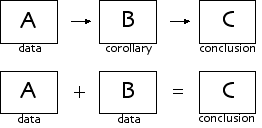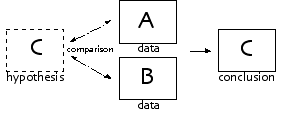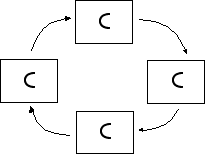| Monday, November 3, 2003 |
| Deduction and Induction |
 There are two methods of logical reasoning that are often contrasted with each other. There are two methods of logical reasoning that are often contrasted with each other.
Here's deduction. That's when A leads to B that leads to C. Or A + B leads to C for that matter. You try to follow a logical sequence, trying to include all the facts and weeding out any variables, in order to logically prove the inevitable conclusion. Because this is true, then that must be true, and therefore we can conclude so-and-so. These are some of the problems with deduction: A. The human mind is badly suited for including all relevant facts. We use pattern matching to make sense out of anything, so no matter what we think is concise, comprehensive and logical, it most likely isn't. B. The human language is not precise. Words are abstract, and different people don't mean exactly the same by them. C. Deduction can fairly easily be manipulated by providing or revealing only those elements that will support a given conclusion.  Then there's induction. That's where you make a mental leap and guess at the conclusion first, and then you go and check if it fits with the facts at hand. And, presumably, if you succeed in coming up with a theory that fits all the facts and hand, and that can be repeated and verified, then you've got a good answer. Or you'll find out that your hypothesis is wrong, because it doesn't explain the facts you see. Then there's induction. That's where you make a mental leap and guess at the conclusion first, and then you go and check if it fits with the facts at hand. And, presumably, if you succeed in coming up with a theory that fits all the facts and hand, and that can be repeated and verified, then you've got a good answer. Or you'll find out that your hypothesis is wrong, because it doesn't explain the facts you see.
Some of the problems with induction are: A. The human mind is also rather badly suited for coming up with original explanations that aren't based on what previously has been fed in. B. If one starts believing the inducted idea, there's a tendency to filter out any data that doesn't fit it, and it doesn't actually get verified. And there's a problem with both that they're all just good guesses. You can be good at logic, and follow stringent steps of analysis and reasoning, and consistently come up with good predictions, much superior to blind, random guesses, but they're still really just qualified guesses. Good science uses both deduction and induction. You use induction to come up with new theories that might explain more things, and you do experiments and deduct what they're showing you. Bad science does roughly the opposite. E.g. make new theories and forget to verify them properly. Or, deduct from previous theories in order to conclude what's impossible and therefore shouldn't be explored. And rule out new theories because they don't fit with the old theories. You know, "planes can't fly because they're heavier than air", or "we won't see any extraterrestrials come here because it is impossible to travel faster than light". Personally I like using deduction for solving puzzles, and I tend to be good at drawing the logical conclusion from data that is available. But to create my picture of the world, I much prefer to use induction. I.e. I search for, or imagine, the models that will explain more of the world I know than the models I previously used. And which I can verify by experiment in my own life, and/or which will better predict events than the alternative models. I recommend it. But watch out for people who would like to sell you more limiting world views and explanations, based on that they have been "proven" and yours have not. The logical wires have been crossed a bit there. If you have a model or world view that allows you to successfully understand, explain and predict many things, don't buy a model that explains and predicts less, no matter what authority backs it up, or questions yours. Astrology is a fine example there, particularly because a lot of people will think that it isn't. If you're a skilled astrologer who can probably successfully understand and explain and predict lots of things about people, you might once in a while run into an angry scientific type who insists that it is a big fraud, and you're an idiot, because nobody's found any mysterious rays from the planets that are controlling people. And he's typically implicitly inviting you to drop your large vocabulary of patterns and archetypes and relationships, and replace it with, essentially, the belief that you can't really predict anything much about people's lives and personalities, and random data and luck is about the best you can get. Is that better? If astrology actually works for you, obviously no. If it doesn't, maybe you should keep looking. Reading tea leaves is not necessarily better than checking out the available facts. The test is of course whether it works. The most satisfying, all-encompassing, verifyable, workable, simple explanation is the better one. That it is big and complex doesn't make it better. Simpler is better. But the point is to use the model that works best for you.  So, what about, say, religious explanations? Well, if you're actually reasoning yourself conscioiusly towards a more complete cosmology, the same rules apply. If you're accepting somebody else's explanation, you might very well be subject to the pitfalls mentioned above. I.e. you get to see exactly what you expect to see and nothing else. Specifically religious discourse seems to be fruitful ground for the circular kind of reasoning, where you logically 'prove' to yourself that the foundation for your belief is sound, simply by starting with a datum and coming back to it a little later. So, what about, say, religious explanations? Well, if you're actually reasoning yourself conscioiusly towards a more complete cosmology, the same rules apply. If you're accepting somebody else's explanation, you might very well be subject to the pitfalls mentioned above. I.e. you get to see exactly what you expect to see and nothing else. Specifically religious discourse seems to be fruitful ground for the circular kind of reasoning, where you logically 'prove' to yourself that the foundation for your belief is sound, simply by starting with a datum and coming back to it a little later.
You know, "Jesus died for MY sins, so I really owe him to listen to his words, and what he says is in the bible, so it must be true, because he said it, and it says that he died for my sins." A mix-up of what is the hypothesis and which is the data. "Nothing can travel faster than light because we have a theory that says so, so therefore we aren't looking for it, and therefore we haven't seen anything do so, and therefore it is proven." Evolutionists versus Creationists is probably another area where you'll find plenty of circular reasoning, where you prove your point by your own arguments. One way or another, there isn't quite any logical panacea that you can prove everything with. Developing a useful picture of the world is done with some mixture of an open mind, your own intuition, keen observation, experimentation, luck, good advice, access to good data, verificaton of the validity of data AND some discipline of logical reasoning. [ Patterns | 2003-11-03 13:27 | 4 comments | PermaLink ] More > |
| The Holographic Universe |
| I don't really understand a word of this article in Scientific American. But it seems that a reknowned theoretical physicist is suggesting that the universe is a 3-4 dimensional hologram created from a 2 dimensional array of information. In part because, surprisingly, a 2D surface can contain more information than a 3D construct, as the latter would collapse by its own mass into a black hole at some point. Which is all certainly an intriguing idea. You know, a hologram is created by shining light on a special piece of film, and a 3D picture is created. So, as to the universe, it would mean that what we see and walk around in is an illusion generated from light and information. Which of course makes it seem kind of likely that we can generate something a little or a lot different by changing the information a bit. [ Science | 2003-11-03 13:27 | 6 comments | PermaLink ] More > |
| Jews |
| A few people responded to my previous post about an EU poll of which country would be the biggest threat to world peace, and hinted that I'm anti-semitic for posting it, and for voicing an agreement with the majority opinion expressed in it. And, well, that's a rather explosive thing to even try to discuss, but I'm trying anyway.
When I grew up in Denmark, the history of the German occupation and extermination of Jews was a big part of our education. And there would be no question about that we of course were on the side of the persecuted Jews and against the Nazis. But it was also sort of an abstract thing. I didn't really know what a Jew was. Meaning, it would be sort of a puzzle to me why Jewish people were singled out. I couldn't really see any difference between Jewish people and non-jewish people. Did they have more crooked noses, or what's the deal? And why should that be a problem? I really didn't get it. I couldn't understand how it could be a racial thing when the people percecuted didn't look any different from anybody else. When I moved to the U.S. it became a little more clear. In part because there's a lot of racism in the U.S. Let me clarify. In California I didn't experience much racism in terms of some skin colors being considered less than others. Maybe a little bit of looking down on Mexicans, but I didn't really understand that either, as I don't perceive hispanic people as being of any different race than I am. But the kind of racism I'm talking about is kind of in reverse. There was a lot of attention put on people's races. When I filled out public forms, I'd have to check off that I was "Caucasian", whatever the hell that is supposed to mean. And everybody's very sensitive about stating that somebody's african-american or hispanic or asian-american or something. And very afraid of offending anybody. I really found it rather tasteless to always emphasize races, when I'd really much rather have that we're all just humans, which is pretty much how I see it. And it was in the U.S. that I first met people who would identify themselves as Jewish. My boss for a number of years, whom I was very fond of, was Jewish. As was a bunch of the managers. And I went to his son's bar-mitzvah. Which was enjoyable. The ceremony in the temple was really lively and down-to-earth. In my lunch break I would frequently go and eat fallafels in an Israeli food place. Every week there was a rabbi speaking to a group of people there, telling stories from the Torah and explaining what they meant. Which I found rather enjoyable too. And all of which only gave me a pleasant feeling about the Jewish culture and religion. And then there's the Kabbalah, which is a great source of wisdom. Certainly nothing has given me any reason to conclude that Jewish people across the board would somehow be something to be against. I haven't found anything about Jewishness not to like. And the whole idea of being anti- some particular cultural or racial group, that's very foreign to me. At the same time I do understand that various kinds of people might carry deep-seated grudges against each other. Cultural groups that have very stronly negative opinions about each other, often based on things that happened a very long time ago, but which somehow is part of the cultural heritage. Again, I have a hard time personally identifying with that, as I don't have any personal experience to relate it with. But I realize that it is different for some people. I still get kind of puzzled and surprised when once in a while I run into Jewish people who have very strong opinions when the subject of the Israel-Palestinian conflict comes up. Or, rather, strong opinions do not surprise me, and would be perfectly understandable. Rather when what a moment ago what was a pleasant, relaxed, well-reasoned person suddenly is somebody apparently filled with hatred and anger and vengeance. Somebody going to great lengths to convince me that I'm an idiot if I don't understand that Palestinians, as well as all Arabs, are violent, lying, criminal sub-humans who aren't to be trusted. And that Palestinians don't deserve any land to live on, because it was never theirs in the first place, and there's really no such things as "Palestinians", and it would be easier to just mow down the whole lot anyway. And if I dare to disagree, that's around the time when I get called anti-semitic, and somebody will question why I've listened so much to Arab propaganda that I can have such an outrageous opinion. Note, I'm not trying to generalize that all Jewish people see it that way. They most certainly don't. And I'm not trying to generalize that it is a particularly Jewish thing. I'm sure there are plenty of Palestinians or Arabs who'd prefer that all Jews would be wiped off the face of earth. For some reason they just haven't crossed my path much, other than on TV. And I'm sure there are plenty other groups that feel in similar ways about each other. Yugoslavia, Rwanda, etc. But I can say with some confidence that that attitude certainly doesn't help in creating peace anywhere. Whatever past history of transgressions it is based on. And I can say that it is my opinion that the Israeli government is going about the matter completely wrong, and probably is guilty of many war crimes. And, sure, most likely Arafat is a bumbling idiot and has missed several great opportunities for peace laid out in front of him. And, sure, strapping explosives to your body and blowing up innocent people in buses and shopping centers, that's a very bad idea. As is gunship attacks on people's homes. All of it is just escalating a conflict that didn't have to exist. I happen to think the Israeli government holds most of the cards, and that it is playing them wrong. And I suppose the people in the Israeli government are Jewish. Does that make me anti-semitic? Not any more than my opinion that George W's government is illegitimate and corrupt makes me anti-caucasian or anti-christian or anti-american. People and governments are different things. Individual people, such as government leaders, are different things than the country or race or culture they come from. I usually can't recognize Jewish people unless they identify themselves as such. It doesn't matter to me if you're Jewish or not. Or whether you're Muslim or not. If you are and it is important to you, great. But I don't go around looking for signs that you're in some kind of cultural or religious group that I can then have a bias for or against. If you have a unique perspective or an interesting heritage, I might very well be interested in hearing it. But as far as I'm concerned, I'm a member of humanity, and so are you. [ Opinions | 2003-11-03 15:02 | 44 comments | PermaLink ] More > |